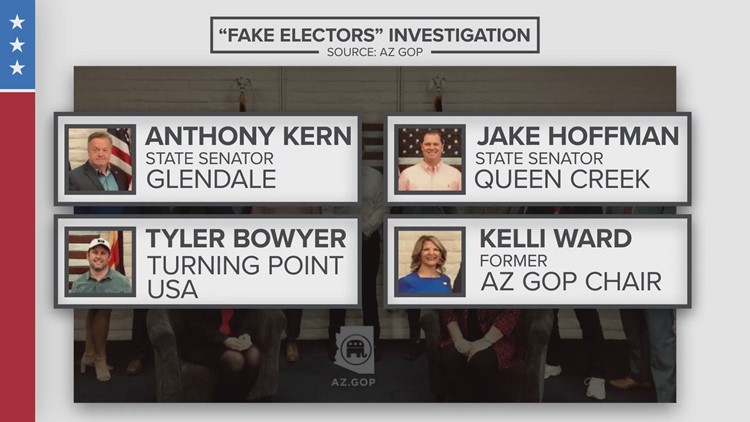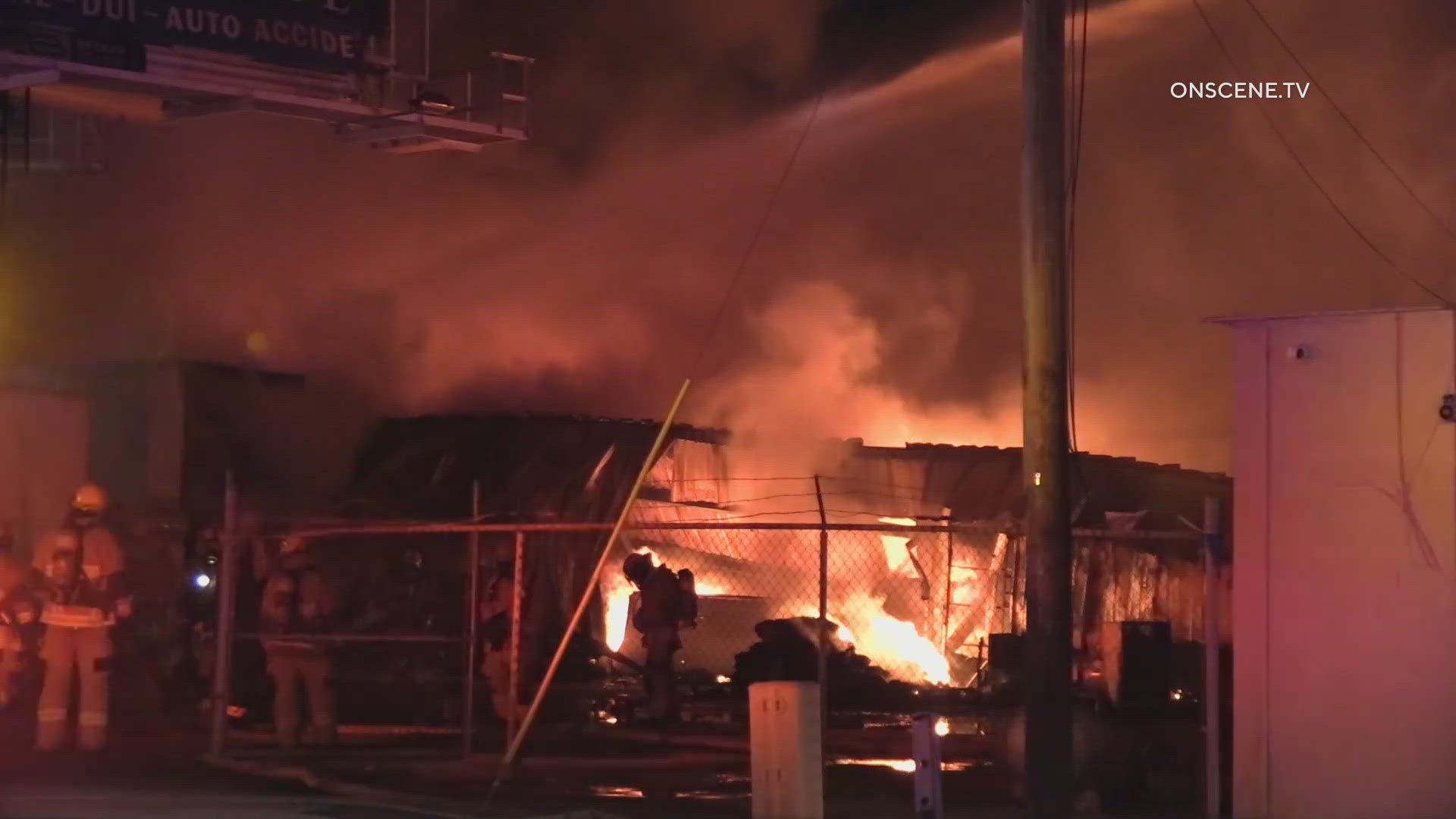PHOENIX — An Arizona grand jury handed down indictments of 11 Republicans Wednesday afternoon, alleging they committed fraud in their efforts to overturn the results of the 2020 Presidential election.
Attorney General Kris Mayes' decision comes in the midst of the 2024 presidential campaign. The first-term Democrat has said in interviews that she's mindful of the election calendar.
Arizona is the only one of the seven battleground states targeted by Trump allies where the fake electors scheme, hatched in the weeks after the 2020 elections, remains legally unresolved.
VERSIÓN EN ESPAÑOL: Todo el contexto que debe saber sobre los cargos del miércoles a ‘electores falsos’
The charging decision marks the culmination of a year-long investigation that began about four months after Mayes, a Democrat, succeeded two-term Republican AG Mark Brnovich.
Mayes attributed the investigation's late start to Brnovich's inaction during his final two years in office, much of it consumed by his failed run for the U.S. Senate.
The scheme was a desperate attempt by the Trump campaign to create false certificates signed by Trump electors in battleground states. The certificates declared Trump - not Biden - the winner of that state's electoral votes.
The false certificates were then sent to the National Archives, with the intention of sewing confusion during the electoral vote count in Congress on Jan. 6, 2021.
The plan would have erased the votes of millions of Americans.
Here's some deep background about the fake electors scheme and the investigation:
What Arizona's Phony Electors Did
The organizers weren't trying to hide it.
Arizona's 11 phony Trump electors convened around a conference table on Dec. 14, 2020, at Republican Party headquarters in central Phoenix.
The party posted the video of "The Signing" on social media.
Then-party Chair Kelli Ward crowed: "Oh yes we did! We are the electors who represent the legal voters of Arizona!"
Earlier that day, Joe Biden's 11 Arizona electors - the actual legal electors - were casting their votes at a Phoenix location. The location was undisclosed for security reasons.
It was just six weeks after Biden had won Arizona by a razor-thin margin.
In public and, as would soon become clear, in private, Arizona Republicans and the defeated president were mounting an unprecedented pressure campaign to overturn the vote in the state's largest county, Maricopa, where Biden was the the first Democratic winner in 70 years.
7 Battleground States Targeted
If Mayes announces criminal indictments, Arizona will be the fourth state to bring charges against phony electors.
Prosecutors in Georgia, Nevada and Michigan have brought criminal charges against central figures in fake elector schemes there.
Phony electors in Pennsylvania and New Mexico avoided prosecution by filing elector certificates that were conditioned on Trump winning legal battles that would have overturned the 2020 election results.
In Wisconsin, a civil lawsuit was settled in March.
Who Were Arizona’s 11 Fake Electors?
Here’s what we know about the central figures, based on reporting and research by 12News, as well as reporting by the Washington Post, Politico, and the New York Times:
Kelli Ward, Arizona Republican Party chair from 2019 until 2023. Ward acted as a go-between for the Trump White House in its pressure campaign to overturn Arizona’s presidential vote in 2020.
Michael Ward, husband of Kelli Ward who also was a flight surgeon with the Arizona Air National Guard.
State Sen. Jake Hoffman of Queen Creek. Hoffman leads the Legislature’s far-right Arizona Freedom Caucus. He followed up on his vote as a fake elector with a two-page letter to Vice President Mike Pence on Jan. 5, 2021, urging Pence to order that Arizona’s presidential electors be decided by a vote of the Republican-controlled Legislature.
Jim Lamon, a former U.S. Senate candidate who was a major funder of the state Republican Party. Lamon lost the 2022 Senate Republican primary to Blake Masters.
Tyler Bowyer, Republican National Committeeman from Arizona. In February, Bowyer failed to persuade the Republican National Committee to cover the fake electors’ legal bills.
Both Hoffman and Bowyer have connections to Turning Point USA, the Scottsdale-based right-wing organization that has assumed a prominent place in Arizona Republican politics.
State Sen. Anthony Kern of Glendale, a Republican candidate for Congress in the West Valley’s Eighth District. Kern is the only fake elector who has publicly lashed out, accusing Mayes and Democratic Gov. Katie Hobbs of plotting to send him to jail. Kern spoke out on the Maricopa County Courthouse steps after he testified before the grand jury in March.
Greg Safsten, former executive director of the Arizona Republican Party. He is a former deputy chief of staff for Republican Congressman Andy Biggs of Gilbert and was a legislative director for former GOP Congressman Matt Salmon of Mesa.
Robert Montgomery, former chairman of the Cochise County Republican Committee. Montgomery testified before the Arizona grand jury in late March, according to a news report.
Samuel I. Moorhead, second vice chair of the Gila County Arizona Republican Party.
Nancy Cottle and Loraine B. Pellegrino served as "chairperson" and "secretary" of the non-existent "Electoral College of Arizona" on documents that purported to represent the 11 Arizona electoral votes cast for President Donald Trump. Both Cottle and Pellegrino are longtime grassroots activists.
Cottle and Pellegrino, as well as the Wards, were all subpoenaed by the U.S. House of Representatives’ Jan. 6 Select Committee as part of its investigation of phony slates of electors in several states.
Behind the Scenes
Jack Wilenchik was the Arizona Republican Party’s lawyer and a crucial intermediary in setting up the vote by the phony electors. Wilenchik works at the law firm co-founded by his mother, Becky Bartness, and father, Dennis Wilenchik. Both Wilenchiks have represented countless Republican elected officials over the years. Jack Wilenchik's web page highlights President Donald Trump's pardon in 2017 of a Wilenchik client — former Maricopa County Sheriff Joe Arpaio.
According to the State Bar of Arizona, Wilenchik is being investigated by the independent Bar counsel on two charges related to elections. The Bar doesn't release information to the public on open charges.
Michael Roman was indicted in Georgia's investigation of Trump’s attempt to overturn the election results there. According to news reports, Roman was subpoenaed by Arizona investigators.
Roman was a Trump campaign operative whose job was to track all the phony electors lined up for the Dec. 14 signing and find replacements for any who couldn’t or wouldn’t show, according to Roman’s emails released to investigators and the Jan. 6 committee report.
Documents Single Out 3 AZ GOP Officials
Thanks to legal action in the other states, Arizona investigators may have a roadmap for how the scheme came together here.
The architect was Trump-allied attorney Kenneth Chesebro. Court documents show he collaborated with former Trump lawyer Rudy Giuliani, Trump campaign officials and individuals in several states.
Chesebro struck a plea deal to a felony charge in the Georgia elector investigation and was part of the Wisconsin settlement. He has also cooperated with the Michigan investigation.
Chesebro has provided a trove of documents to investigators, as well as sat for interviews.
Chesebro reportedly met with Arizona investigators for the first time last December. He described Arizona's central role in the scheme in an email entered as a court exhibit.
Court documents reveal that at least two of Arizona’s 11 phony Trump electors - the former Arizona Republican Party chair Kelli Ward and the party’s former executive director, Greg Safsten - were kept in the loop by Chesebro in the days and hours leading up to the signing of the phony elector certificate on on Dec. 14, 2020.
Chesebro’s Georgia indictment names Safsten as the recipient of documents for use with Arizona's phony electors.
Chesbro was also in frequent contact with the Arizona Republican Party’s Phoenix attorney, Jack Wilenchik.
In the Wisconsin case, Chesebro and a co-defendant turned over more than 1,400 emails, texts and other documents that shine a light on Ward, Safsten and Wilenchik’s activities, according to a 12News review of documents compiled by Law Forward:
-Ward and former GOP state lawmaker Kelly Townsend shared their concerns with former Trump adviser Rudy Giuliani that signing the bogus elector document might be “treasonous.”
-As detailed in the Georgia indictment, Chesebro emailed detailed instructions to Safsten on how to carry out the signing of the phony electors’ declaration.
-Chesebro told Trump campaign officials that Wilenchik “understands the point of voting Dec. 14, but does not seem particularly enthused by it.”
Biggs, Gosar Subpoenaed
Politico reported late in the investigation that Republican Congressmen Andy Biggs of Gilbert and Paul Gosar of Flagstaff were subpoenaed by Mayes’ investigators. It’s not known whether either of them testified before a grand jury.
Both Biggs and Gosar were also subpoenaed by investigators for the Jan. 6 Select Committee looking into their role in the events leading up to the Jan. 6 insurrection at the Capitol.
According to testimony before the Jan. 6 committee and the panel’s reports, Biggs had sought a pardon from Donald Trump before Trump left the White House in 2021. Biggs has maintained that he didn’t seek a pardon.
Who Could Be Charged?
Mayes and her staff have indicated they will only file charges that they are confident will result in convictions. The AG's office has provided no insight into specific charging decisions.
According to attorneys, charges could range from interfering with an election to the kind of serious felony counts, like mail fraud, commonly found in white-collar prosecutions.



